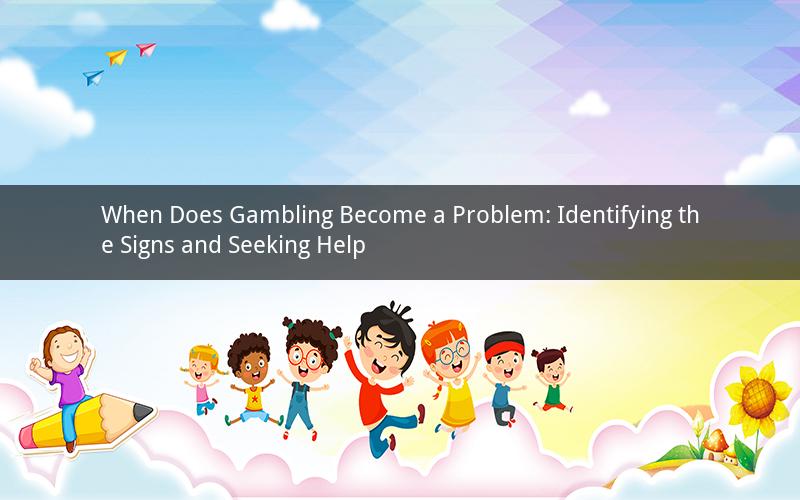
Introduction:
Gambling is a popular form of entertainment that can bring excitement and enjoyment. However, for some individuals, it can cross the line and become a significant problem in their lives. Understanding when gambling becomes a problem is crucial in identifying the signs and seeking help. This article explores the signs that indicate gambling has become a problem and provides guidance on seeking support.
1. What are the signs that indicate gambling has become a problem?
One of the first signs that gambling has become a problem is when it starts to interfere with other important aspects of your life. Here are some common signs to look out for:
- Financial difficulties: If gambling is causing you to struggle financially, such as overspending, falling into debt, or missing payments, it may be a sign that gambling has become a problem.
- Relationship problems: If gambling is affecting your relationships with family, friends, or partners, causing arguments or emotional distress, it is a clear indication that it has become a problem.
- Work or school difficulties: If gambling is impacting your performance at work or school, such as missing deadlines, failing exams, or being fired, it is a sign that gambling has become a problem.
- Legal issues: If gambling is leading you to engage in illegal activities or face legal consequences, it is a clear sign that it has become a problem.
- Emotional and psychological issues: If gambling is causing you to experience increased stress, anxiety, depression, or other emotional or psychological problems, it is a sign that it has become a problem.
2. How can I seek help for gambling problems?
If you recognize that gambling has become a problem in your life, it is essential to seek help. Here are some steps you can take:
- Talk to someone you trust: Sharing your struggles with a trusted friend, family member, or counselor can provide support and guidance.
- Seek professional help: Consider seeking help from a mental health professional specializing in gambling addiction. They can provide therapy, counseling, and support tailored to your needs.
- Join a support group: Joining a support group, such as Gamblers Anonymous, can provide a community of individuals facing similar challenges and offer practical advice and emotional support.
- Explore treatment options: Various treatment options are available, including inpatient and outpatient programs, therapy, medication, and self-help strategies.
3. What are the risks of untreated gambling problems?
If gambling problems go untreated, they can have severe consequences on various aspects of your life. Here are some risks associated with untreated gambling problems:
- Financial ruin: Untreated gambling problems can lead to significant financial difficulties, including bankruptcy, loss of assets, and reliance on loans or credit cards.
- Relationship breakdown: Continued gambling can strain or destroy relationships with family, friends, and partners, leading to isolation and loneliness.
- Legal problems: Engaging in illegal activities to fund gambling can result in legal consequences, such as fines, imprisonment, or a criminal record.
- Mental health issues: Untreated gambling problems can exacerbate existing mental health issues, such as depression, anxiety, and substance abuse disorders.
4. Can gambling problems be cured?
Gambling problems are treatable, and many individuals have successfully overcome their addiction. While there is no quick fix, the key to recovery lies in taking proactive steps and seeking ongoing support. Here are some strategies for overcoming gambling problems:
- Acknowledge the problem: Admitting that gambling has become a problem is the first step towards recovery.
- Seek professional help: A mental health professional can provide guidance, therapy, and support throughout the recovery process.
- Develop healthy coping mechanisms: Identify and implement healthy coping mechanisms to deal with stress, anxiety, or other triggers that may lead to gambling.
- Build a support network: Surround yourself with supportive individuals who can offer encouragement, accountability, and understanding.
- Avoid triggers: Identify and avoid situations or environments that may trigger gambling urges.
5. How can I support a loved one with gambling problems?
If you have a loved one struggling with gambling problems, it is essential to offer support and understanding. Here are some ways to help:
- Educate yourself: Learn about gambling addiction to better understand your loved one's struggles and the recovery process.
- Offer empathy and support: Show empathy and provide a non-judgmental environment where your loved one feels safe to share their feelings and experiences.
- Encourage professional help: Encourage your loved one to seek help from a mental health professional or support group.
- Help with practical matters: Assist your loved one in managing financial or legal issues resulting from gambling.
- Be patient and persistent: Recovery is a process, and it may take time. Stay patient and persistent in offering support and encouragement.
Conclusion:
Gambling can be an enjoyable form of entertainment, but it can become a problem when it starts to interfere with other aspects of your life. Recognizing the signs of gambling problems and seeking help is crucial for overcoming addiction. By taking proactive steps, building a support network, and seeking professional help, individuals can overcome gambling problems and regain control of their lives.